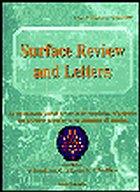|
Literature / Source Database:
Surface Review and Letters
| Title (short) |
Surf. Rev. Lett. |
| Title (abbrev) |
SRL |
| Languages |
English |
| First year |
1994 |
| Impact factor |
0.435 |
|
|

|
Status
active
Indexing
Science Citation Index®; Science Citation Index Expanded (also known as SciSearch®); ISI Alerting Services; Materials Science Citation Index; Current Contents®/Physical, Chemical & Earth Sciences; Astrophysics Data System (ADS) Abstract Service; INSPEC; Compendex
Subject

Source type
Journal
Publisher
ISBN ISSN
0218-625X
First volume
1
Last volume
14+
Homepage
| Resources |
|
Availability |
|
|
|
|
|
| Text PDF |
 |
free access |
 |
| Text Html |
 |
for subscriber |
 |
| References |
 |
not available |
 |
| Abstracts |
 |
|
|
| TOC |
 |
|
|
|
|
|
|

Description
Surface Review and Letters is an international journal devoted to the elucidation of properties and processes that occur at the boundaries of materials. The scope of the journal covers a broad range of topics in experimental and theoretical studies of surfaces and interfaces. The latter include solid-solid and liquid-solid interfaces. Both the physical and chemical properties are covered. The journal also places emphasis on emerging areas of cross-disciplinary research where new phenomena occur due to the presence of a surface or an interface. Representative areas include surface and interface structures; their electronic, magnetic and optical properties; dynamics and energetics; chemical reactions at surfaces; phase transitions, reconstruction, roughening and melting; defects, nucleation and growth; and new surface and interface characterization techniques. The journal publishes scientific papers in the following three categories: (a) Letters: Letters are short communications announcing particularly significant discoveries where timely publication is a key factor. Each letter should contain a coherent and reasonably complete discussion of the discovery within the constraints of a short communication. A letter should not exceed eight printed pages. (b) Research Articles: Research articles are comprehensive presentations of original research. The presentation should contain enough details so that a knowledgeable scientist in the field could follow the steps of derivation with reasonable ease. (c) Review Articles: Review articles are selected for their critical assessment of important areas of interest. Either a single review or a group of reviews covering a spotlight area is featured. The authors and subject matter of the reviews are recommended by the Editorial Board.
|